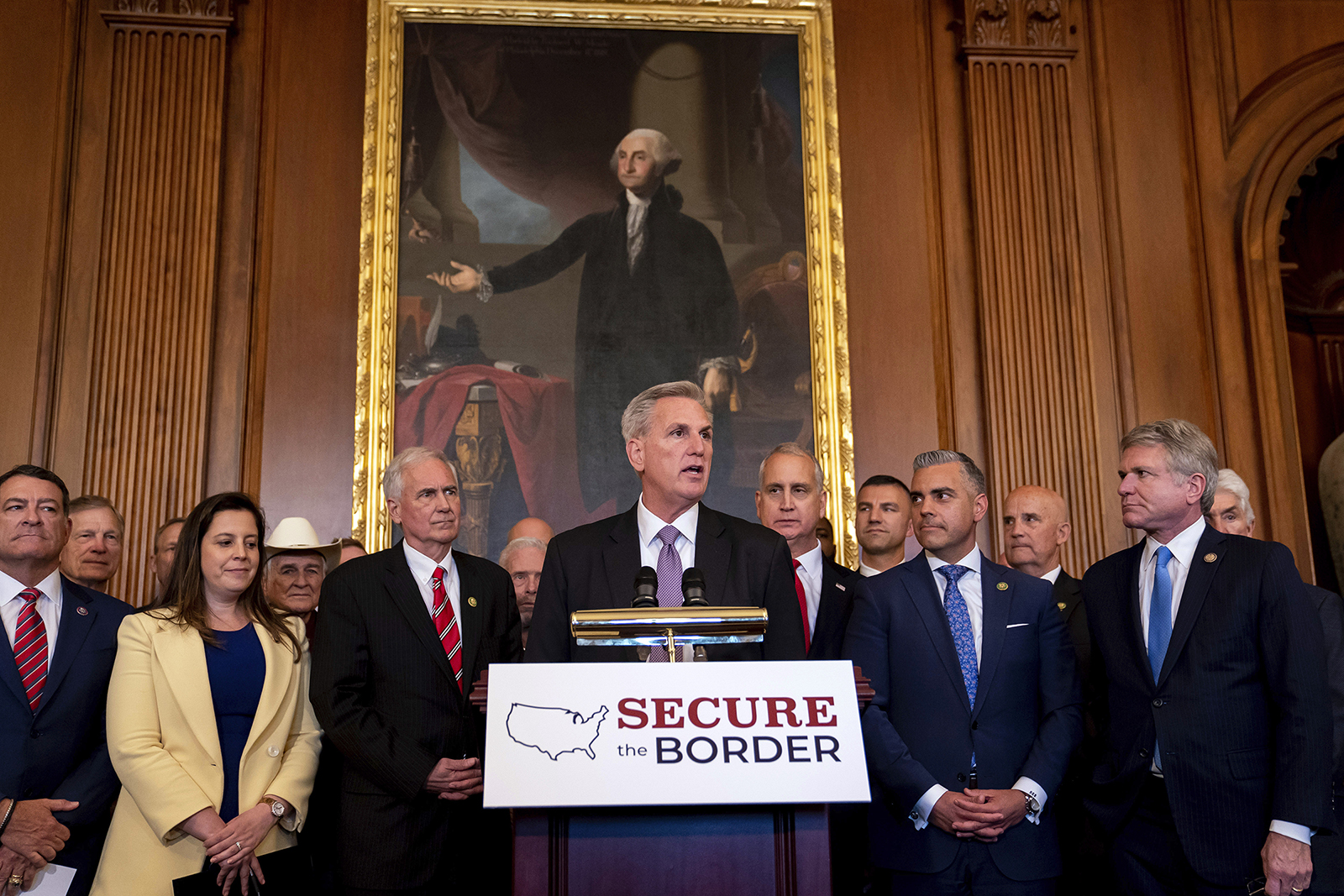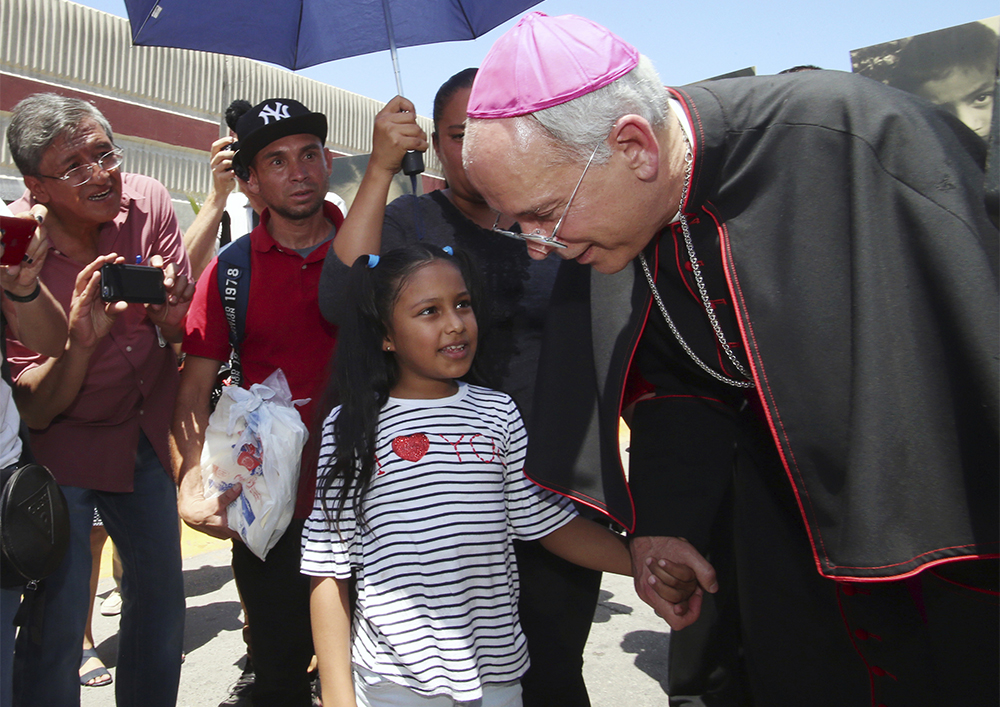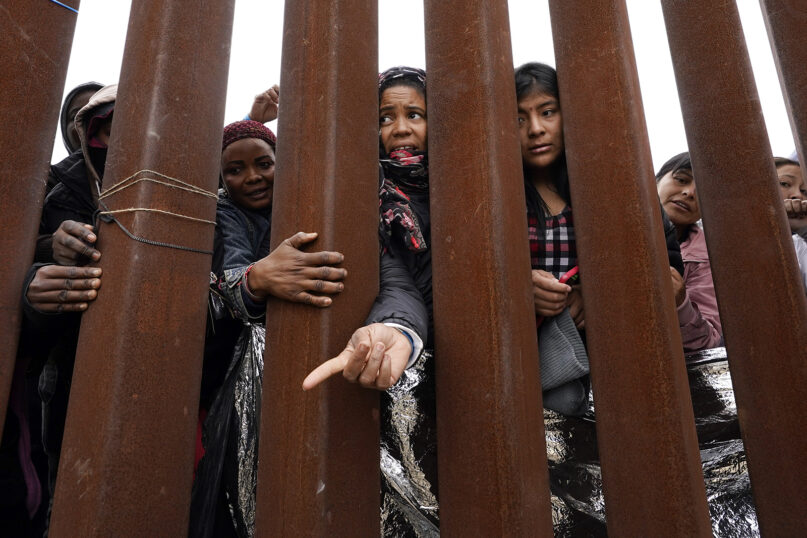(RNS) — Over the opposition of Catholic aid organizations, the U.S. House of Representatives passed a GOP-backed bill on Thursday (May 11) that would cut federal funding for non-governmental organizations providing services to migrants along the U.S.-Mexico border.
The Secure the Border Act bill passed by a vote of 219-213, just hours before the Title 42 public health rule, which allowed the government to quickly expel undocumented immigrants crossing the border, was set to expire with the end of the COVID-19 public health emergency.
The bill, which is not likely to pass the Democrat-controlled Senate, also aims to restrict the number of people granted asylum. It would restart border wall construction and slash a program that allows U.S. officials to accept of quickly turn away some migrants from Venezuela, Haiti and Nicaragua.
Florida Republican Mario Díaz-Balart, who introduced the bill, spoke on the House floor Thursday in support of the proposed legislation, saying it would “restore order to the southern border” and “protect innocent minors while enforcing the rule of law.” He lambasted the Biden administration and House Democrats for having “abdicated their responsibility to uphold our national security.”
President Joe Biden, who is facing backlash from faith-based groups over new asylum restrictions he announced Wednesday, has vowed to veto the House bill.
Faith-based ministries, many of them Catholic, provide a range of services to migrants in need.
Hope Border Institute has offered humanitarian aid in Juarez, Mexico, through a joint project with the Diocese of El Paso, helping churches and other groups to offer food, clothing and shelter to migrants. Another Catholic organization, Kino Border Initiative, provides shelter and legal services to migrants in its aid center in Nogales, Sonora, Mexico. Catholic Charities of the Rio Grande Valley operates a respite center to help migrants with food, medical and legal assistance.

House Speaker Kevin McCarthy, of Calif., center, speaks during a news conference following a vote on H.R. 2, a bill to build more U.S.-Mexico border wall and impose new restrictions on asylum seekers, in the Rayburn Room at the Capitol Building in Washington, Thursday, May 11, 2023. Democrats, who have a narrow hold on the Senate, have decried the aggressive measures in the bill as “cruel” and “anti-immigrant,” and President Joe Biden has already promised he would veto it. (AP Photo/Nathan Howard)
If enacted, said El Paso Bishop Mark J. Seitz in a letter to members of Congress, the bill would “fundamentally weaken our nation’s decades-long commitment to humanitarian protection.”
In December, congressional Republicans sent a letter to Catholic Charities, the U.S. branch of the Catholic humanitarian aid organization, expressing their concerns that NGOs are “fueling the drastic increase in illegal aliens crossing the southern border” and promising to “investigate your organization’s role in facilitating the border crisis, your potential violations of federal law, and your misuse of taxpayer funds,” when the GOP assumed the majority in Congress this year.
Catholic Charities responded at the time, writing, “Our life-saving humanitarian work neither violates federal laws nor endangers communities.”
Responding to the bill after it was introduced on May 2, Sister Donna Markham, president and CEO of Catholic Charities USA, submitted a letter saying the legislation would “severely hinder” the government and NGOs “from aiding migrants who need services, care, and assistance.”
“The gospel calls us to provide shelter for those who are homeless, feed the hungry, and ‘welcome the stranger.’ The work of Catholic Charities is humanitarian not political,” Markham said.
By prohibiting funding to faith-based organizations and other NGOs, it would cancel the “cooperation of these organizations with federal, state, and local governments in receiving newcomers, combatting human trafficking, addressing homelessness, and responding to natural disasters and other emergencies,” Markham said.

El Paso Catholic Bishop Mark Seitz talks with Celsia Palma, 9, of Honduras, as they walked to the Paso Del Norte International Port of Entry on June, 27, 2019, in Juarez, Mexico. Seitz escorted the girl, her parents and two siblings across the port of entry to U.S. immigration authorities so they could be processed into the U.S. (AP Photo/Rudy Gutierrez)
Seitz, who chairs the United States Conference of Catholic Bishops Committee on Migration, in his own letter urging lawmakers to oppose the bill, said it was so broadly written that it would affect more than Catholic efforts at the border. The bill, said Seitz, “could even be interpreted to prevent schools, houses of worship, and other organizations” from qualifying for certain grants “amid a rise in violent attacks on those places,” Seitz said.
Calling the bill’s language “overly broad, ambiguous, and unworkable,” Seitz said cutting funding to NGOs would have the opposite of its intended effect, predicting that it would “facilitate or encourage unlawful activity, including unlawful entry.”
A dozen other Catholic organizations, including Kino Border Initiative, Hope Border Institute, Franciscan Action Network and NETWORK Lobby for Catholic Social Justice, issued their own letter on May 10 to urge the House to vote against the measure, which they said will “harm both immigrants and the communities who receive them.”
The organizations said the bill will lead to further deaths and suffering of the people they are called by their faith to support, adding that the legislation will also hurt “Catholics who want to live and practice our faith while following the law.”
“For decades Catholic organizations, dioceses and congregations have partnered with federal and state governments regardless of political party, to provide succor to all in need, especially our immigrant siblings. This bill will jeopardize those successful partnerships,” the letter read.
The Secure the Border Act, according to the Catholic groups, will affect the day-to-day operations of Catholic shelter, respite and care centers, “because we believe in the dignity and sanctity of life and therefore our faith does not allow us to deny food and shelter to people simply because they do not have the right papers.”





